|
|
|
Sort Order |
|
|
|
Items / Page
|
|
|
|
|
|
|
| Srl | Item |
| 1 |
ID:
103870
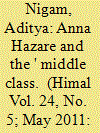

|
|
|
| 2 |
ID:
147228
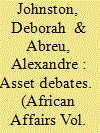

|
|
|
|
|
| Summary/Abstract |
Asset indices are ubiquitous in the debate about well-being in African countries, not least because of the paucity of traditional household income and expenditure data. Indeed, asset data have fuelled the creation of a new, more optimistic picture of well-being in Africa, where both income and the middle class are growing fast. This is the first review of the use of asset indices for African countries. Readers are guided through key debates over the use of asset data, including the use of assets to measure trends over time as well as socio-economic status and class. We argue that the theoretical and empirical advantages of the asset index over traditional welfare measures are clear, but that caution is needed. Most asset indices show significant improvements in private wealth and social welfare in African countries due to increases in the number of household assets and improvements in health and education. However, we argue that simplistic conclusions in the economics literature about the growth of income or of a ‘middle class’ using asset indices are poorly founded.
|
|
|
|
|
|
|
|
|
|
|
|
|
|
|
|
| 3 |
ID:
146714
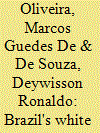

|
|
|
|
|
| Contents |
After Honduras, Paraguay, Peru and Argentina, Brazil now has a new conservative government intent on correcting the left leaning course of the previous administration led by the Workers’ Party. This paper explains the reasons for the disenchantment of the electorate with the policies of President Dilma Rousseff in a climate of economic crisis and widespread corruption. It argues that, taking advantage of the government’s weakness, the old business elites and landowning oligarchy have retaken power in a white coup in order to restore the status quo ante and preserve their long held dominance by using the pretext of corruption of which however they are the main practitioners and beneficiaries.
|
|
|
|
|
|
|
|
|
|
|
|
|
|
|
|
| 4 |
ID:
128544
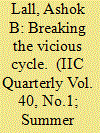

|
|
|
| 5 |
ID:
110095
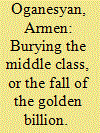

|
|
|
|
|
| Publication |
2011.
|
| Summary/Abstract |
THE CURRENT ECONOMIC DOWNTURN, like others before it, has shattered many dreams. But this is the first to have devastated so many people at once, regardless of class or social status - from pauper to prince. Thanks, globalization.
Well, globalization is not entirely to blame. A crisis like the present one has never befallen such an affluent society, one that has become accustomed to prosperity and opportunities on a mass scale.
Despite the tensions of the Cold War (or possibly thanks to them), the decades of postwar stability generated an unprecedented surge in technology and consumption. Ordinary Europeans and Americans had been breathing the illusory air of the "end of history" long before Francis Fukuyama made his famous prophecy.
|
|
|
|
|
|
|
|
|
|
|
|
|
|
|
|
| 6 |
ID:
151230
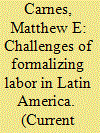

|
|
|
|
|
| Summary/Abstract |
Most workers in Latin America have jobs that are off the books, without benefits or middle-class status. Innovative programs are seeking to redress that. Fifth in a series on labor relations around the world.
|
|
|
|
|
|
|
|
|
|
|
|
|
|
|
|
| 7 |
ID:
129327


|
|
|
| 8 |
ID:
110515
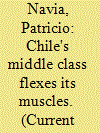

|
|
|
|
|
| Publication |
2012.
|
| Summary/Abstract |
Large, diverse, and increasingly confident, the country's middle class is demanding that social policies be redesigned to fit its needs.
|
|
|
|
|
|
|
|
|
|
|
|
|
|
|
|
| 9 |
ID:
106089
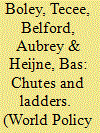

|
|
|
| 10 |
ID:
118881
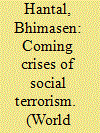

|
|
|
| 11 |
ID:
160892
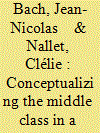

|
|
|
|
|
| Summary/Abstract |
The category ‘middle class’ was used increasingly throughout the 2010s to identify social changes occurring in African countries, including Ethiopia. However, the category itself is hard to define and has been employed to describe very diverse socio-economic dynamics. This article offers an original way of considering the ‘middle class’, focusing on what the category is expected to produce for the different actors utilizing it. We argue that the debate on ‘middle class’ social composition cannot be undertaken before deconstructing and discussing why, how and by whom the category is being used. As the notion of the middle class is subjectively and locally produced in every country, we focus on the perceptions and narrative of the category by external and internal actors and the specific political implications of such views in the Ethiopian context. By analyzing the international discourses and the Ethiopian leadership’s views, we demonstrate the fluidity of a notion deeply rooted in and interpreted based on specific institutional, ideological, and social backgrounds, and at the same time serving specific economic and political ambitions. In this regard, the Ethiopian case reveals how divergent actors have been promoting that same category with great differences in their interpretation and expectations. We thus argue that the category ‘middle class’ remains analytically useful only if not considered as an objective socio-economic category, but rather as a politically constructed category.
|
|
|
|
|
|
|
|
|
|
|
|
|
|
|
|
| 12 |
ID:
097453
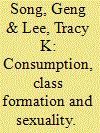

|
|
|
| 13 |
ID:
113968
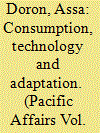

|
|
|
|
|
| Publication |
2012.
|
| Summary/Abstract |
On the edges of the digital world in India, there are millions of mobile phone users. To cater for these consumers, an economy of mobile phone care and repair has emerged in almost every town. Through the experiences of consumers and repairers, this article explores technology distribution, service practices and economic opportunity. How do they learn their trade? How do they make a living? And how do they position themselves in relation to the official branded manufacturers and licensed agents? Conceptually, the article is concerned with the nexus between consumer culture, the Indian middle class and the poor and how they engage global capitalism. It argues that middle-class ideologies and practices of consumption are both exclusive and expansive. At the same time, the poor seek to engage this economy by tapping into the unauthorized sector that responds to their demands for local participation in the global economy, while keeping them also at a certain distance from the forms and symbolic capital of the new economy.
|
|
|
|
|
|
|
|
|
|
|
|
|
|
|
|
| 14 |
ID:
112742
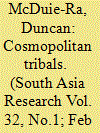

|
|
|
|
|
| Publication |
2012.
|
| Summary/Abstract |
Based on fieldwork, this article examines various aspects of tribal migration from the Northeast frontier of India to Delhi, a phenomenon which increased rapidly in the last half decade or so. This offers insights into four important interlinked processes. First, such migration indicates significant changes taking place in the Northeast itself. While many migrants leave the region to escape conflict, many more simply seek to find work, pursue education and fulfil changing aspirations. Second, tribal migration to Delhi reveals the ways in which the city itself has been changing. While tribal migrants search out employment opportunities in neoliberal capitalist spaces, employers in such spaces have specific reasons to desire tribal labour, particularly in shopping malls and call centres. Third, tribal migrants encounter racism and discrimination in Delhi and their experiences reveal how racial issues function and are debated today within India. Fourth, tribal migrants themselves embody the dramatic discord between the ways tribals see themselves and the ways they are perceived in India.
|
|
|
|
|
|
|
|
|
|
|
|
|
|
|
|
| 15 |
ID:
170003
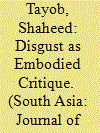

|
|
|
|
|
| Summary/Abstract |
Hindu nationalist discourse articulates a link between the violence of slaughter and the notion of a violent, abject Muslim as the cruel ‘other’. However, for Muslims in Mumbai, the cruelty of slaughter is not inherent, and questions of order and propriety are heavily circumscribed by communal politics. This paper presents moments during Bakri Id (Qurbani) and everyday life when participants evoke or experience disgust. Drawing on a discursive tradition of slaughter, together with everyday observations on infrastructure, order and marginalisation by middle-class Muslims from various walks of life, focuses attention on the way disgust is and is not experienced by Muslims in the city. I argue that these instances of disgust are moments of embodied critique that secure the middle-class Muslim as subject by pointing to the histories of marginalisation, infrastructural neglect and improper religious practice.
|
|
|
|
|
|
|
|
|
|
|
|
|
|
|
|
| 16 |
ID:
131805
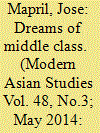

|
|
|
|
|
| Publication |
2014.
|
| Summary/Abstract |
In the past 20 years, Bangladeshi migration to Southern European countries has gained an increasing importance. Portugal is no exception, and today more than 4,500 Bangladeshis live in the country. One of the more interesting facets of this population, though, is their educational and economic profile. They come from what has been roughly summed up as the 'new' Bangladeshi 'middle classes'. Their families are both rural and urban, have properties, and own businesses. Other members of their domestic units work in NGOs, and private and state owned companies. Simultaneously, they have considerable educational backgrounds, with college and university degrees, and most are fluent in English. But what was their motivation to come to Europe in the first place? And what does this tell us about the young Bangladeshi middle class? For these young Bangladeshi adults, it is through geographic mobility that one can earn enough economic capital to access the 'modern' and to progress in the life-course. By remaining in Bangladesh, their access to middle class status and adulthood is not guaranteed and thus migrating to Europe is seen as a possible avenue for achieving such dreams and expectations. The main argument in this paper is that migration-as a resource and a discoursive formation-is itself constitutive of this 'middle class'.
|
|
|
|
|
|
|
|
|
|
|
|
|
|
|
|
| 17 |
ID:
159320
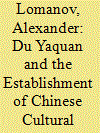

|
|
|
|
|
| Summary/Abstract |
At the end of the 1910s, Du Yaquan, Chinese thinker, essayer, and popularizer of science, became a proponent of the ideology of cultural conservatism, which called for a mutual blending and harmonization of the cultures of China and the West. His political views, including the concept of the continuity of statehood, his interpretation of the relationship between the old and new in China's development, and his understanding of the social basis of the revolution are examined using primary sources. It is concluded that Du's world view became an expression of the ideas of conservatism, which tried to prevent a break with national traditions in the course of building a new culture.
|
|
|
|
|
|
|
|
|
|
|
|
|
|
|
|
| 18 |
ID:
185895
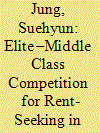

|
|
|
|
|
| Summary/Abstract |
This paper examines the anti-corruption movement initiated by Kim Jong Un, focusing on the increased rent-seeking competition between the elite and the middle class as market mechanisms have developed in North Korea. I examine two hypotheses regarding this program. First, it is focused on constraining the influence gained by the elite through power–money collusion to maintain regime stability. Second, it aims to support decentralizing economic reforms and the direction of production surplus into state finances, to secure state revenue. In substantiating these hypotheses, I argue that the movement is driven by the goal of capitalizing on the benefits of the market without compromising regime security, by regulating “competitive rent-seeking” between the elite and the middle class.
|
|
|
|
|
|
|
|
|
|
|
|
|
|
|
|
| 19 |
ID:
106497
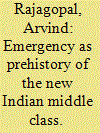

|
|
|
|
|
| Publication |
2011.
|
| Summary/Abstract |
Recent accounts of the National Emergency of 1975-1977 concur that the deviations it represented, while genuine, did not represent any fundamental change on the part of the Indian state, and that the period offers little distinct insight on the post-independence period as a whole. This paper seeks to argue, to the contrary, that the Emergency was a watershed in post-independence history. With its ban on dissent and suspension of constitutional rights, the Emergency sought to suppress all political disturbances to governance. By doing so, it forefronted the problems of postcolonial politics in at least three respects. First, the Emergency demonstrated that coercion was inextricably combined with consent in state-led development. Second, this led to a heavy reliance on practices of communication to redefine coercion and to stage popular consent. Third, in the process, the boundaries of the political were reinforced, emphasizing the friend/enemy difference fundamental to politics. Governance in the aftermath of the Emergency placed an overt reliance on consent over coercion, but in ways that are themselves significant. Categories of culture and community, and related forms of social distinction, gained in importance over earlier developmental distinctions premised on an authoritarian relationship between state and the people. The change meant a shift away from the Nehruvian focus on the economy as the crucial arena of nation-building, involving labour as the key modality of citizenship. Instead, culture and community became the categories that gained political salience in the period of economic liberalization. The mass media were central to this redefinition of the political, multiplying in size and reach, and acquiring market-sensitive forms of address couched in the rhetoric of individual choice. These events, I suggest, are critical to understanding the formation of the new middle class in India, as a category that increasingly defines itself through cultural and consumerist forms of identity, and is less identified with the state.
|
|
|
|
|
|
|
|
|
|
|
|
|
|
|
|
| 20 |
ID:
119760
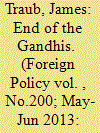

|
|
|
|
|
|
|
|